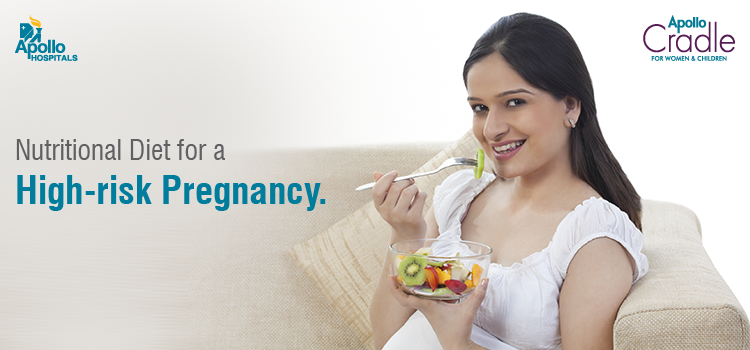We have all heard the saying ‘we are what we eat’. While all of us need to maintain a healthy and balanced diet, it is especially a matter of concern for a pregnant woman. A nutritious diet becomes even more imperative in a pregnancy that has high-risk factors like age – being too old or too young, health problems including high blood pressure, diabetes, obesity or being overweight, multiple births leading to premature labour, and more. High-risk pregnancies have complications that can affect either the baby or mother or both. In such situations, a woman has to be extra cautious about her eating habits.
There are many foods in the food pyramid that a woman should consume or avoid before, during and after pregnancy. Eating for two is a common misconception – While many think that this means that they must eat twice their normal intake in a day, it means to eat keeping in mind that what nutrients they consume will also be eaten by their baby.
List of Nutrients Baby Must Consume
Proteins– A pregnant woman must consume proteins three times a day, preferably during each meal to support the healthy growth and development of the baby. Foods that are rich in proteins include meat as well as poultry, fish and eggs, as well as dairy products like cheese, ghee and milk. They must also try to munch on nuts and seeds between meals as these have high protein levels. Proteins are often referred to as ‘builder foods’ as they help in forming the baby’s important organs like the heart and the brain.
Whole grains– Fortunately, in the Indian diet, half of the carbohydrates come from whole grain foods. Foods such as chappatis, whole grain wheat, oatmeal, and brown rice give the soon-to-be mother energy to keep her going throughout the day and are a good source of Vitamin B, fibre and iron.
Dairy– This is the third important food group that pregnant women must consider in their diet plan as dairy products provide calcium, potassium, Vitamin D and protein, all of which are needed to strengthen the baby’s bones. At least two to three helpings a day of milk, curd (dahi) and cottage cheese (paneer) must be consumed by expecting mothers.
Fruits and Vegetables– These vibrant and colourful natural foods are very nutritious for pregnant women. They must concentrate on the consumption of fruits and vegetables, especially during the second and third trimesters of pregnancy. Five to ten servings of fruits must be consumed every day. It does sound like a lot, but it is needed to maintain a healthy body as fruits and vegetables are rich in fibre, vitamins and minerals and low in calories. One must take care not to add too many unnecessary fats like oil as it may lead to gaining unwanted weight.
The right choice of food and beverages by a woman during pregnancy is crucial as it is these choices that are the main supply of nourishment to the baby. Caffeine is a beverage that is very hard to just stop drinking, thus, doctors have now allowed mothers to drink up to 12 ounces of coffee a day which amounts to one cup. Consumption of this much caffeine will not prove to be harmful to the baby or contribute to any complications. Fish is also a good source of protein for mothers, but certain types of fish that have a high level of mercury must be avoided completely as mercury is proven to be harmful to the developing brain of the baby.
Other foods that must be avoided by mothers include unpasteurized and processed foods, raw and uncooked meat as well as all forms of alcohol.
When you attempt to eat right every day for the sake of your baby, you also help yourself in the process.



